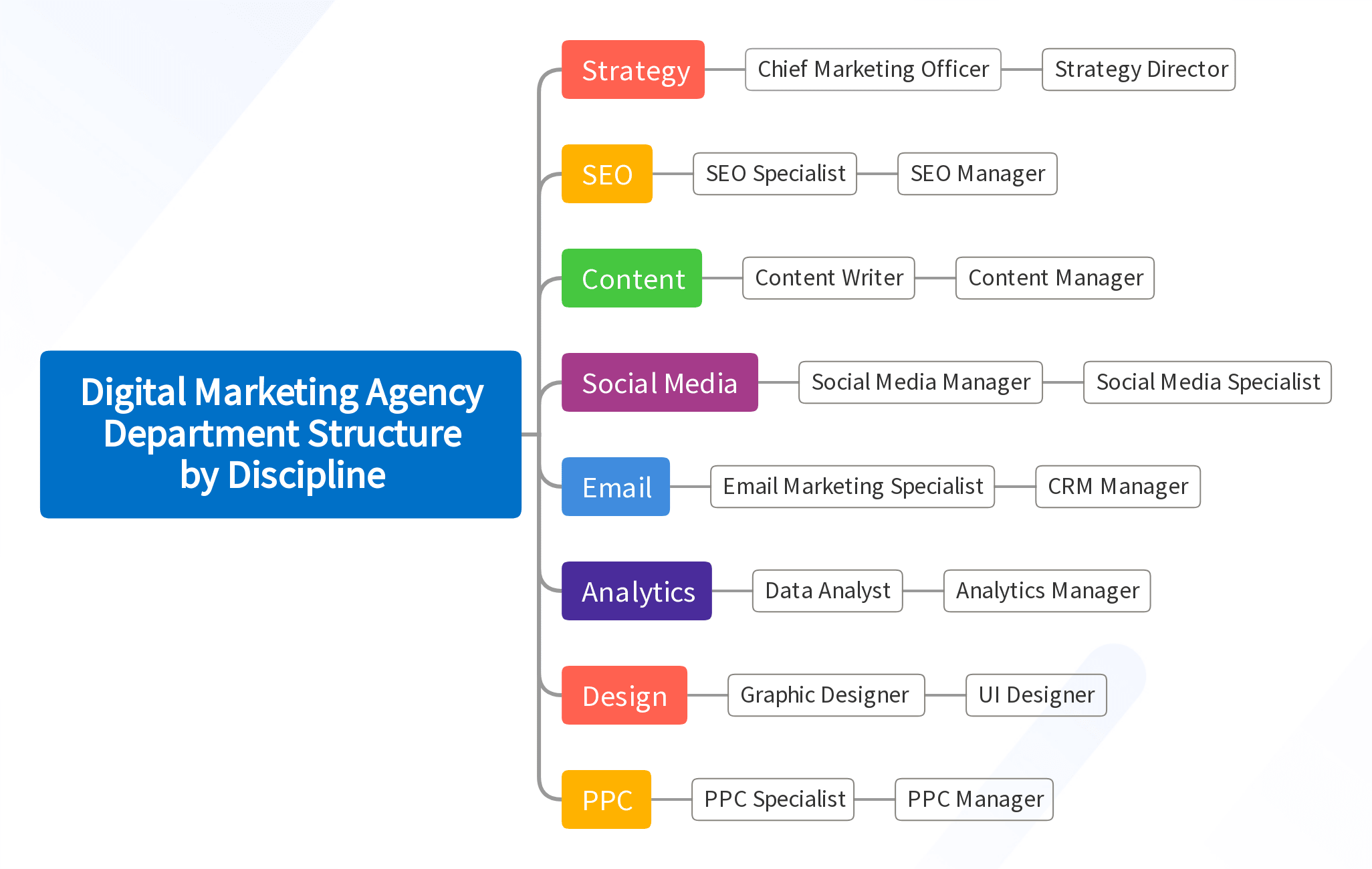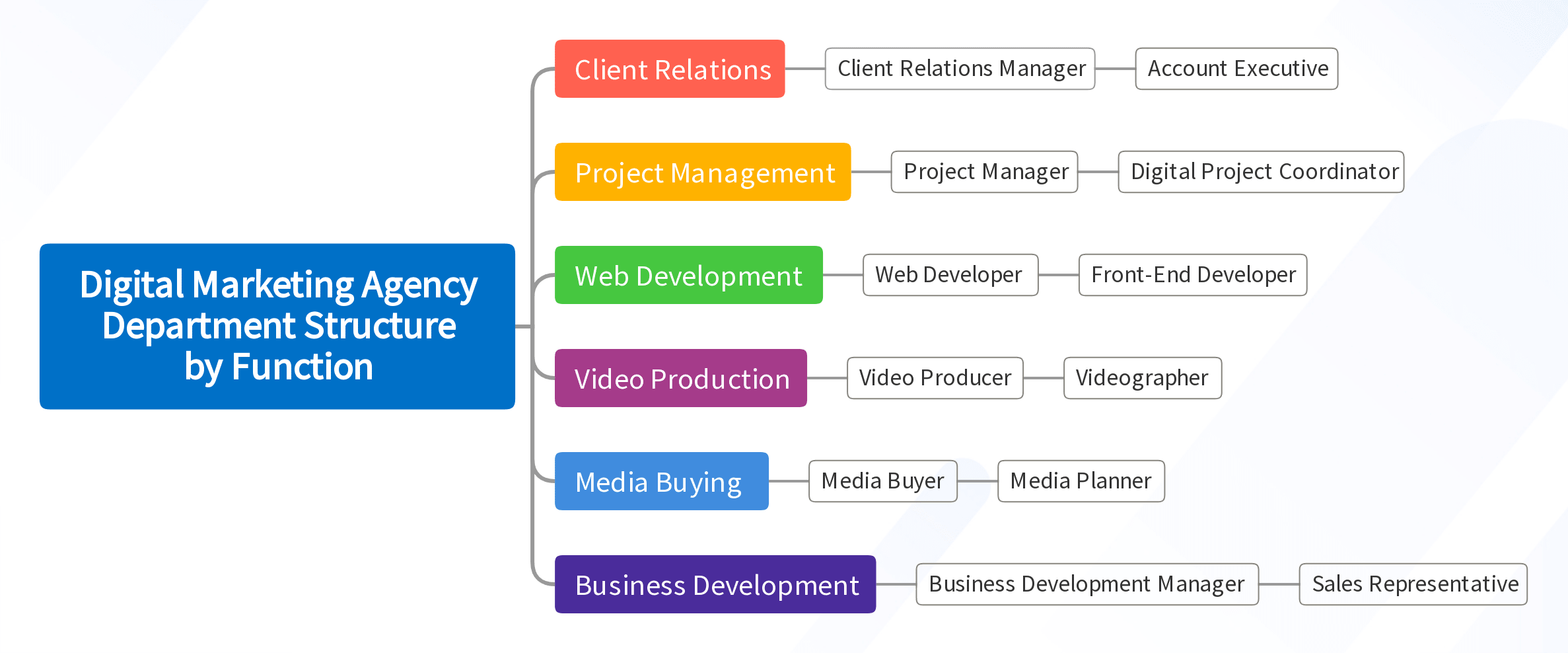

Digital marketing agency teams form the backbone of many businesses today. Their structure holds the key to navigating the ever-changing digital landscape.
Understanding their composition is vital. It reveals how they adapt to dynamic business environments and drive success. We've learned this firsthand while growing our own marketing agency, GrantSpark.
But first, let's talk about the Digital Marketing Agency department structures you have to choose from.
Best for Growth Marketers
Best for Paid Ads & CMO's
Table of Contents
Structuring Digital Marketing Agency Department
There are two main types of department structures based on company size and resources.
- Digital Marketing Agency department structure by discipline
- Org Type: Traditional corporate departments
- Best For: Midsize/Enterprise companies
- Digital Marketing Agency department structure by function
- Org Type: Employees are grouped by activities and objectives
- Best For: Small to Medium Sized Business (SMB)
Let’s go in-depth to each one of them.
1. Digital Marketing Agency Department Structure by Discipline


Discipline-based structure involves building teams centered around various marketing disciplines. For example, SEO, Content, Market Research, and Product Strategy could each form separate teams within a department.
| Discipline | Key Skills | Potential Roles |
|---|---|---|
| Strategy | Market Research, Competitor Analysis, Strategic Planning | Chief Marketing Officer, Strategy Director |
| SEO | Keyword Research, Link Building, On-Page and Off-Page SEO | SEO Specialist, SEO Manager |
| Content | Content Creation, Copywriting, Content Strategy | Content Writer, Content Manager |
| Social Media | Social Media Strategy, Community Management, Content Scheduling | Social Media Manager, Social Media Specialist |
| Email Campaigns, Segmentation, Performance Analysis | Email Marketing Specialist, CRM Manager | |
| Analytics | Data Analysis, Web Analytics, Conversion Rate Optimization | Data Analyst, Analytics Manager |
| Design | Graphic Design, User Interface Design, Branding | Graphic Designer, UI Designer |
| PPC | Ad Creation, Bid Management, Campaign Optimization | PPC Specialist, PPC Manager |
2. Digital Marketing Agency Department Structure by Function


Another approach is structuring by function, where teams are formed based on the different functions they perform. For example, promotion, launches, and relationship management could all be separate teams.
| Function | Key Skills | Potential Roles |
|---|---|---|
| Client Relations | Communication, Problem Solving, Client Management | Client Relations Manager, Account Executive |
| Project Management | Time Management, Organizational Skills, Risk Management | Project Manager, Digital Project Coordinator |
| Web Development | HTML/CSS, JavaScript, Responsive Design | Web Developer, Front-End Developer |
| Video Production | Video Editing, Storyboarding, Motion Graphics | Video Producer, Videographer |
| Media Buying | Negotiation, Media Planning, ROI Analysis | Media Buyer, Media Planner |
| Business Development | Sales, Networking, Lead Generation | Business Development Manager, Sales Representative |
Digital Marketing Agency Team Size versus Business Scale
To achieve successful marketing outcomes, you need to align the team size with your business's scale – a strategic approach that helps optimize resources and drive targeted growth.
| Business Scale | Ideal Department Size | Explanation |
|---|---|---|
| Start-up | 1-3 | Small team can handle limited needs and save costs. |
| Small-Medium Business | 4-8 | Increased needs require a larger team for effectiveness. |
| Large Enterprise | 9+ | Comprehensive demands necessitate a big, specialized team. |
Factors to Consider When Deciding On a Digital Marketing Agency Department Structure
- Business Objectives: Understand your company's goals and how digital marketing can help achieve them. The structure of your agency should align with these objectives to ensure effective strategies and campaigns.
- Clientele Profile: The needs and expectations of your clients greatly influence your agency's structure. Different industries require varied digital marketing approaches, so tailor your team around the specific requirements of your clients.
- Skills and Expertise: Identify the key skills and expertise needed in your agency. This can range from SEO specialists to content creators. The structure should facilitate the smooth functioning and collaboration of these diverse skill sets.
- Agency's Size: The size of your agency will dictate its structure. A small agency might require team members to wear multiple hats, while a larger agency can afford more specialization.
- Scalability: Consider how your agency's structure will allow for growth in the future. It should be flexible enough to accommodate an increase in clients, services, or team members without disrupting the existing setup.
Explore other marketing departments:
So, there you have it, a detailed overview of a Digital Marketing Agency team structure. From the essence of the team and key roles, to structuring and optimizing; every aspect tailored to achieve success on your business blueprint.




















